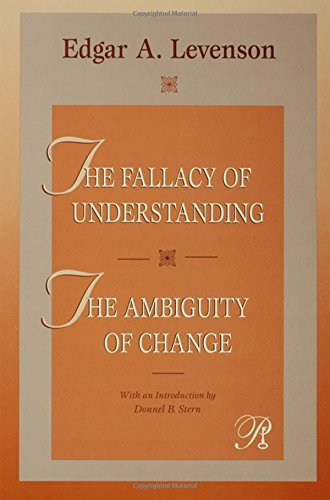

Most ebook files are in PDF format, so you can easily read them using various software such as Foxit Reader or directly on the Google Chrome browser.
Some ebook files are released by publishers in other formats such as .awz, .mobi, .epub, .fb2, etc. You may need to install specific software to read these formats on mobile/PC, such as Calibre.
Please read the tutorial at this link. https://ebooknice.com/page/post?id=faq
We offer FREE conversion to the popular formats you request; however, this may take some time. Therefore, right after payment, please email us, and we will try to provide the service as quickly as possible.
For some exceptional file formats or broken links (if any), please refrain from opening any disputes. Instead, email us first, and we will try to assist within a maximum of 6 hours.
EbookNice Team

Status:
Available5.0
28 reviewsIn The Fallacy of Understanding (1972) and The Ambiguity of Change (1983), Edgar Levenson elaborated the many ways in which the psychoanalyst and the patient interact - unconsciously, continuously, inevitably. For Levenson, it was impossible for the analyst not to interact with the patient, and the therapeutic power of analysis derived from the analyst's ability to step back from the interactive embroilment (and the mutual enactments to which it led) and to reflect with the patient on what each was doing to, and with, the other.
Invariably, Levenson found, the analyst-analysand interaction reprised patterns of experience that typified the analysand's early family relationships. The reconceptualization of the analyst-analysand relationship and of the manner in which the analytic process unfolded would become foundational to contemporary interpersonal and relational approaches to psychoanalysis and psychotherapy. But Levenson's perspective was revolutionary at the time of its initial formulation in The Fallacy of Understanding and remained so at the time of its fuller elaboration in The Ambiguity of Change.
The Analytic Press is pleased to reprint within the Psychoanalysis in a New Key Book Beries two works that have proven influential in the realignment of psychoanalytic thought and practice away from Freudian drive theory and toward a contemporary appreciation of clinical process in its interactive, enactive, and participatory dimensions. Newly introduced by series editor Donnel Stern, The Fallacy of Understanding and The Ambiguity of Change are richly deserving of the designation "contemporary classics" of psychoanalysis.